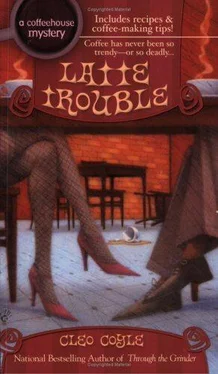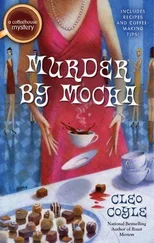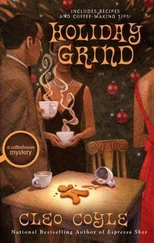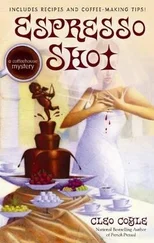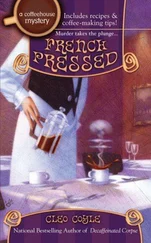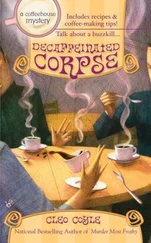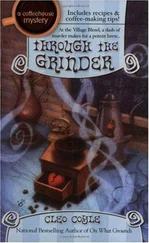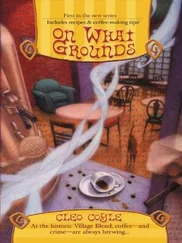Клео Коул - Latte Trouble
Здесь есть возможность читать онлайн «Клео Коул - Latte Trouble» весь текст электронной книги совершенно бесплатно (целиком полную версию без сокращений). В некоторых случаях можно слушать аудио, скачать через торрент в формате fb2 и присутствует краткое содержание. Год выпуска: 2005, ISBN: 2005, Издательство: Berkley, Жанр: Детектив, на английском языке. Описание произведения, (предисловие) а так же отзывы посетителей доступны на портале библиотеки ЛибКат.
- Название:Latte Trouble
- Автор:
- Издательство:Berkley
- Жанр:
- Год:2005
- ISBN:978-0425204450
- Рейтинг книги:3 / 5. Голосов: 1
-
Избранное:Добавить в избранное
- Отзывы:
-
Ваша оценка:
- 60
- 1
- 2
- 3
- 4
- 5
Latte Trouble: краткое содержание, описание и аннотация
Предлагаем к чтению аннотацию, описание, краткое содержание или предисловие (зависит от того, что написал сам автор книги «Latte Trouble»). Если вы не нашли необходимую информацию о книге — напишите в комментариях, мы постараемся отыскать её.
Latte Trouble — читать онлайн бесплатно полную книгу (весь текст) целиком
Ниже представлен текст книги, разбитый по страницам. Система сохранения места последней прочитанной страницы, позволяет с удобством читать онлайн бесплатно книгу «Latte Trouble», без необходимости каждый раз заново искать на чём Вы остановились. Поставьте закладку, и сможете в любой момент перейти на страницу, на которой закончили чтение.
Интервал:
Закладка:
It would be a horrid place to die, and I considered trying to break free of Tiny’s grip, kicking off my heels and running back to the crowded sidewalk. But even if I made it out of his grasp, I doubted I would get more than a few feet before he grabbed me again, or worse—
Did he have a gun? I suddenly wondered. If I tried to run, would he shoot me in the back?
While I pondered these charming possibilities, Tiny and his partner, who was short and wiry like my father but barely in his thirties and wearing a penny-dreadful moustache, led me to an anonymous steel door unmarked and undistinguished, except by layers and layers of graffiti that covered every inch of its surface. A kind of industrial throbbing sounded from the other side of the portal, as if gigantic engines were constantly turning inside the brick building.
Tiny continued to clutch my arm as he banged the door with one massive hand, his pinky ring clacking loudly against the metal. A bolt was thrown, and the door yawned. From the opening, a ghastly lavender florescent hue illuminated the gloom and a pounding wall of techno dance music washed over me.
A dark shape framed by the light came into view. I could feel the man’s eyes studying me, then my abductors.
“Yo, Virgil, it’s us,” said Tiny.
The silhouette in the doorway nodded, then backed up to admit us. Tiny pushed me over the threshold, and in the lavender light I saw that the man guarding the door was draped head to toe in a finely tailored ebony suit. Pale green eyes locked with mine.
“Welcome to the Inferno,” he said without smiling.
The space I entered seemed massive, yet most of its size was lost in dark shadows. To my right was an island of light where a neon bar served up cocktails to a handful of languid lounge lizards.
“This way,” said Tiny, pushing me toward a long inclined ramp that led down to the next level. The floor was concrete, with tall wooden barricades on either side. I realized with a start that I was following the livestock chute. Cattle, pigs, or sheep once ran down this very concrete slope to the slaughter. I hoped I wasn’t following in their hoofprints.
At the bottom of the ramp a wooden gate blocked our progress. Tiny looked up and I followed his stare—surprised to see a man in a leather apron and chaps standing on a wooden platform suspended above us. He gripped a large sledgehammer with both hands, the muscles on his hairy arms rippling against its weight.
“Where is he?” Tiny asked the gatekeeper.
“The Fourth Circle,” the man with the hammer called back. “And watch what you say. He’s in a real pissed-off mood.”
A loud clatter sudden enough to make me jump, and the wooden gate rose. Beyond it only a long concrete hallway illuminated by indigo neon tubes lining the floor, the walls, the ceiling. At the end of that corridor I spied black curtains, heard music and voices from the other side. A pornographic mural on the wall announced in elaborate script that we were now among the “Lustful.”
Beyond the veil, there was a vast area filled to capacity with boisterous partygoers—young, attractive, and affluent, with a smattering of older men and women, sugar daddies and mommies no doubt. The dance floor was large, but not especially user friendly. All the walls and floor were covered with square white tiles, the ceiling crisscrossed with lead pipes and stark aluminum vents; disco and laser lighting scattered about, bathing the revelers in hues of light and dark crimson.
I noticed drains covered by cast iron grates on the gently sloped floor, once used to dispose of the blood and offal of slaughtered animals. On the walls hung bone saws and carving knives. Blades dangled Damocles-like over the dancers. Smoke wafting through the space told me New York City’s rigorous antismoking laws were being only technically enforced—i.e., there was plenty of smoking going on, but none of it smelled like tobacco.
Running along the walls, stainless steel meat-cutting tables doubled for bar space, with a well-stocked raw bar replacing raw meat, and perfectly mixed Bloody Marys substituted for the gore that once pooled here.
It took a few minutes for Tiny and his silent partner to lead me through the throng to the opposite side of the dance floor. We passed a long bar made of glass bricks, illuminated from within by a sanguine red glow. Near the ladies room, I was shown a spiral staircase of heavy cast iron.
“Down you go, lady,” shouted Tiny over the throbbing music.
At the bottom of the stairs, I found myself in a dimly lit, brick-lined basement. Tiny stopped in his tracks, then pointed to a door with a sign that read STAFF ONLY, KEEP OUT.
“In you go. He’s waiting…”
I blinked, not moving. “You’re not coming?” I asked.
“What? You suddenly miss me now?”
“I want my cell phone back,” I said stubbornly.
Tiny rolled his eyes, reached into his leather jacket and pulled out the phone. He flipped it open and checked the display. Then he closed the phone again, and tossed it at me. I caught it with both hands. A glance told me I would get no signal this far underground, so a call for help was out of the question.
“Now get in there,” Tiny barked, slapping my fanny.
Yikes. While I pushed my way through the door, Tiny and the other man turned and climbed back up the spiral staircase. In front of me was a dimly lit room about the size of a small garage. Three old brick walls were completely covered with gold-framed oil paintings of lounging and posed women, dressed in fashions from periods over the last five hundred or so years. The fourth wall was covered with about a dozen flat-paneled TV screens; four were playing high-fashion runway shows, four were playing financial news including stock tickers scrolling data from the Nikkei and the other international exchanges, and the rest were playing news broadcasts from several different countries. All had the sound off.
Background music flowed from an invisible source—not the techno dance beat continuing to pound upstairs, but a retro mix of big bold brass and sax with violins and electric guitar in the back of it. The music was surreally familiar and I suddenly realized why—it was a track from one of the James Bond movies, which Matt had been pretty much obsessed with back in his twenties.
Whatever the floor had been, it clearly had been replaced by new parquet. A huge leopard skin throw rug covered it and mountains of large silk and embroidered pillows had been heaped on top. Antique chairs rimmed the outer edges of the walls and standing glass shelves held an array of red and white wines, colorful liqueurs, and hard liquor.
Two people were immediately evident, and at my abrupt entrance a man lounging on a pile of pillows and watching one of the stock ticker screens turned his head toward me. I saw the bleached hair and knew at once it was Bryan Goldin. Beside him, a beautiful Japanese woman in a bright yellow kimono, with loose, long black hair, gently stroked his neck with small, delicate hands.
From another pile of pillows, next to a large, elaborately filigreed Moroccan hooka pipe, another figure stirred. His arms were wrapped in the finest Egyptian silk, his long legs were encased in pen jeans, his feet in Bruno Magli leather loafers. Like a spider, the man slowly uncurled himself and rose to face me.
I hadn’t seen his image many times in my life, but I recognized him now. Having just seen his younger face, I’d knew he’d once been strikingly handsome, but obviously no Dorian Gray portrait of this guy was aging in some secret vault because the man looked old beyond his years—and it occurred to me that the roadmap of creases he now displayed probably did trace the dissolute excesses of his years.
Appropriately eccentric for the international fashion scene, the man sported small silver loops in each of his ears, and his hair, once dark and wavy, now hung in a long, gray braid down his back. The conventional features of his once common life had obviously been obliterated for the expected affectations of a more famous one. With curious, intense eyes he stared at me but didn’t approach.
Читать дальшеИнтервал:
Закладка:
Похожие книги на «Latte Trouble»
Представляем Вашему вниманию похожие книги на «Latte Trouble» списком для выбора. Мы отобрали схожую по названию и смыслу литературу в надежде предоставить читателям больше вариантов отыскать новые, интересные, ещё непрочитанные произведения.
Обсуждение, отзывы о книге «Latte Trouble» и просто собственные мнения читателей. Оставьте ваши комментарии, напишите, что Вы думаете о произведении, его смысле или главных героях. Укажите что конкретно понравилось, а что нет, и почему Вы так считаете.
